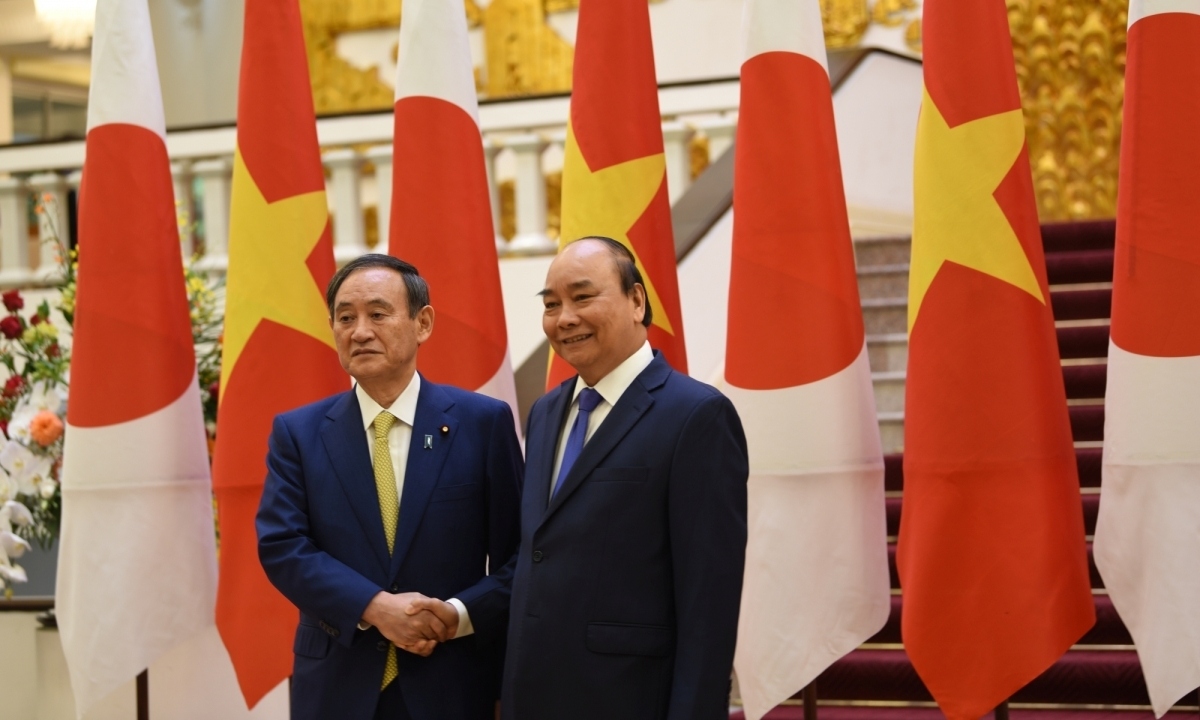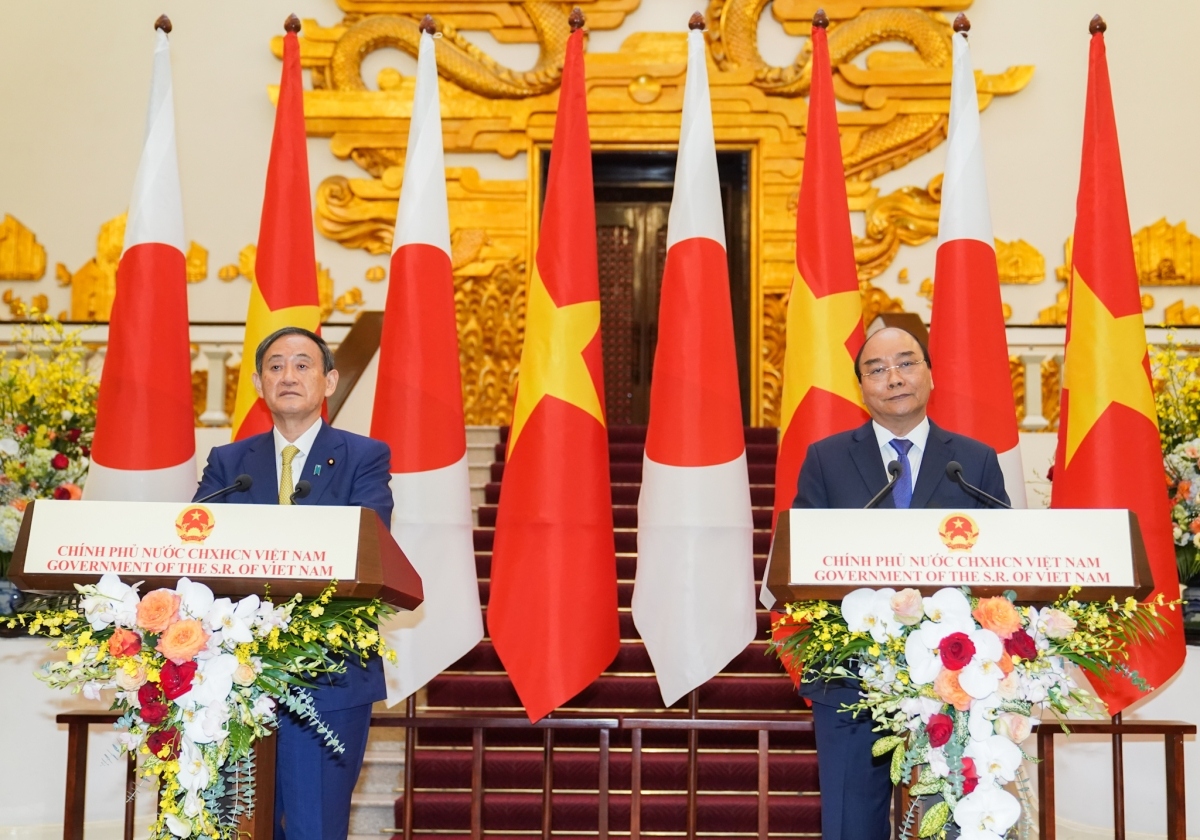Japanese PM believes Vietnam is suitable choice for first overseas visit

Prime Minister Nguyen Xuan Phuc (R) welcomes his Japanese counterpart Prime Minister Yoshihide
Talks were held between Prime Minister Nguyen Xuan Phuc and his Japanese counterpart Prime Minister Yoshihide Suga following an official welcome ceremony which was held in Hanoi on October 19 for the Japanese leader.
During a press conference held to announce the outcomes of the talks, both cabinet leaders stated that the meeting was very successful. The Japanese PM said that Vietnam represents the most suitable country for his first overseas visit after taking office.
In response, PM Phuc stated that a wide range of issues relating to bilateral ties were mentioned as both sides strive to deepen the strategic partnership between the two countries, in addition to restoring and stepping up co-operation in the new normal following the impact of the novel coronavirus (COVID-19) pandemic.
Immediately after talks, the two PMs witnessed a handover ceremony of 12 co-operation documents between ministries, sectors, and enterprises from both countries across a multitude of fields such as infrastructure, energy, and digital technology.
The two sides agreed to consolidate political trust by holding regular exchange visits and meetings with dialogue mechanisms across all levels. In addition to bolstering in-depth and effective co-operation across multiple fields, including defence, security, and COVID-19 prevention and control, especially in terms of economics, whilst restoring co-operation activities between the two countries.
PM Phuc suggested that his guest continue to pay attention to supporting the Vietnamese community based in Japan. Whilst both sides have applied priority travel regulations, commercial routes will soon be restored and the opening of the market for fresh Vietnamese longan fruit and Japanese mandarin will be promoted.

The two PMs at a press briefing announcing the outcomes of their talks (Photo: VGP)
The two leaders consented to continue strengthening the connection between both economies, and promoting co-operation in investment, trade, agriculture, and human resources. PM Phuc therefore affirmed the nation’s readiness to offer favourable conditions for land funds, human resources, the local business environment, and incentive policies aimed at uniting with Japanese enterprises to successfully invest and conduct business in the country. They also agreed to accelerate the implementation of major projects, especially those that are facing obstacles relating to the implementation process.
Following the exchange of co-operation documents, PM Phuc emphasised that this is vivid, strong, and solid proof that mutual co-operation is occurring across many sectors and aspects.
The two PMs also agreed to augment co-operation at multilateral international forums in Vietnam’s capacity as Chair of ASEAN in 2020 and a non-permanent member of the UN Security Council for the 2020 to 2021 term. The nation welcomes Japan, a leading global power, due to its sustained efforts aimed at enhancing its role in making positive contributions to peace, stability, and prosperity in the region and the world at large.
The Vietnamese Government leader also expressed his great appreciation for the strong commitment shown by the Japanese PM to strengthen co-operation within the framework of the ASEAN-Mekong partnership and the United Nations. This includes effective co-ordination and support for the country to successfully organise the ASEAN Summit ahead in November, and effectively carry out economic integration mechanisms, including the Comprehensive and Progressive Agreement for Trans-Pacific Partnership (CPTTP) and the future Regional Comprehensive Economic Partnership (RCEP).
The meeting gave both sides a platform to reaffirm the importance of ensuring peace, security, safety, and freedom of navigation and overflight in the East Sea. Indeed, they are keen to promote the settlement of disputes by peaceful means without the use force or threat of force, whilst strictly complying with international law, especially the 1982 United Nations Convention on the Law of the Sea (UNCLOS) regarding activities at sea.
The pair underlined the need to respect diplomatic and legal processes in place, whilst fully implementing the Declaration on the Conduct of Parties in the East Sea (DOC), in addition to a practical, effective, and consistent execution of the Code of Conduct in the East Sea (COC) in line with International Law and the UNCLOS.
The Japanese PM went on to stress that he would "hold hands" with PM Phuc to continue promoting the development of relations between both nations whilst contributing to peace and prosperity in the region.
Most notably, Japan has chosen to provide emergency support materials to the country in an effort to help overcome the damage caused by heavy rain in central Vietnam. Indeed, the Far East nation has plenty of experience in natural disaster prevention and control, therefore it is willing to share it with Vietnam, the Japanese Government leader said.
The two countries will promote supply chain diversification and make the most of medical equipment supported by the Government of Japan with 4 billion Japanese yen in total. As such Vietnamese nationals living in Japan facing difficulties caused by the COVID-19 pandemic, including trainees, students, and those in need will receive support.
With regard to co-operation aimed at resolving regional issues ahead of the upcoming ASEAN Summit in November, with Vietnam as ASEAN Chair, the two sides agreed to further tighten co-operation in the face of regional challenges, including issues in the East Sea.
Both sides have all but reached an agreement on the transfer of defence equipment and techniques, which is seen as a positive development step in the mutual co-operation in security and defence.
With the two countries exchanging 12 co-operation documents regarding digital technology, the environment, energy, and infrastructure, the Japanese Government and enterprises will continue to support the country in economic development. This includes major infrastructure projects such as the Ho Chi Minh City urban railway project.

